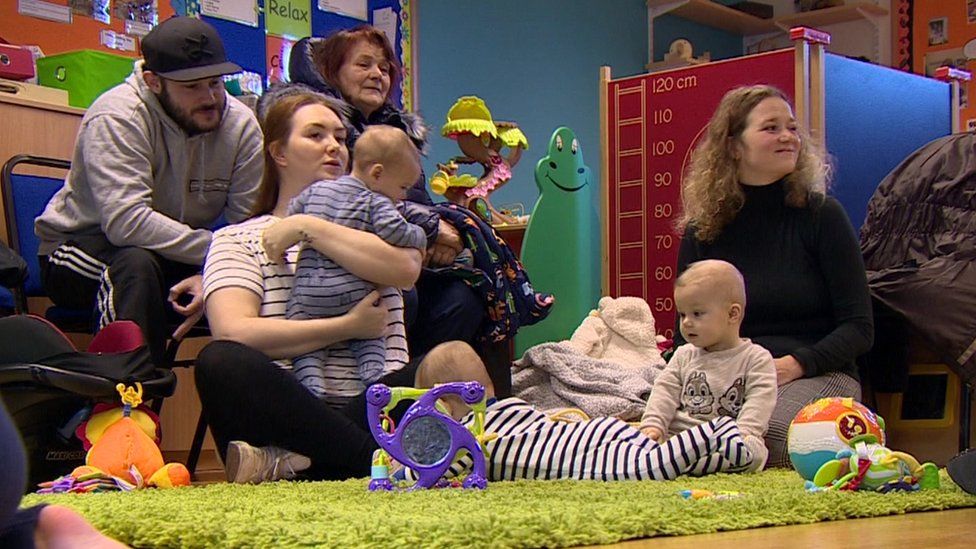Children's centres undermined by ministers, says charity
- Published
- comments

Alka Dass, from High Wycombe, describes her local children's centre as "a lifeline".
She says professional staff there helped bring her back from postnatal depression and grief after a family bereavement.
But the centre, along with 35 others in Buckinghamshire, faces closure under a council plan to replace them with nine "community hubs" and save £3m a year.
A new analysis by a children's charity accuses ministers of undermining England's network of children's centres and making them vulnerable to cuts and closures by cash-strapped local authorities.
Inspections suspended
The Action for Children report focuses on the government's decision to suspend full Ofsted inspections of the centres in September 2015.
Since then, almost 1,000 centres have been due for their five-yearly inspection - about a third of the total, says the charity.
"If these centres aren't inspected they are invisible and what that means is that it's much easier to close them," Action for Children chief executive Sir Tony Hawkhead told the BBC.
He says the temporary suspension was originally meant to allow Ofsted to look at how it inspects children's centres and get its inspection framework and standards absolutely right for the 21st Century.
In response, the Department for Education said it was determined to improve early years provision, adding that, despite the suspension of full inspections, "robust and regular" partial inspections, focusing on early education and childcare at the centres still take place.
"Local authorities which manage children's centres must also ensure that other services provided in the centres have appropriate safeguards in place," said a DfE spokeswoman.
But after two-and-a-half years, there is no sign of full Ofsted inspections being resumed.
"While it continues to drag its feet, central government is letting down tens of thousands of children and families who need support now," said Sir Tony.
"It urgently needs to push through its overdue review of early years services so children's centres have clarity about how they should be working, what they should be achieving and the accountability framework they are working to.
Ms Dass says a campaign to save the Buckinghamshire centres has huge local support, with more than 3,000 people signing a petition.
She says having a children's centre close by in the weeks after the death of her mother and the birth of her son, was "massively important".
"I was quite lost in terms of where to go and not really sure of who I should be speaking to."
At the centre she says she was able to see professionals in a group, "talking about going through postnatal depression and also the grief I had been through".
Without this support, she says, "I am not sure how we would have coped and I am not sure we would have coped very well."
She says the clever thing about the centres is that they combine a social setting for parents and children with crucial services including health and developmental checks, mental health support and budgeting and parenting classes.
"I think people undermine the value of having a cup of tea. You are meeting other mothers and it helps with your child's confidence."
Sir Tony says running down the vital early help provided by children's centres is a false economy.
"In the end, we end up spending far more money on helping children at a later stage."
In a statement, Ofsted confirmed that full inspections of children's centres were still suspended, adding that the policy was a matter for the DfE.
The Local Government Association, which represents councils in England, said significant reductions in funding from central government would mean a £2bn shortfall for councils by 2020.
"Councils have been forced to redirect the funding that remains to protect those children at immediate risk of harm, leaving less money available for early help services such as children's centres," said Richard Watts, chairman of the LGA's Children and Young People Board.
Mr Watts agreed that it would be helpful for the government to review its expectations of children's services to make the best use of limited resources and boost social mobility.
The DfE spokeswoman said the government had also "invested £200m to develop new and better ways of delivering children's services to ensure they are high quality and meet the needs of families across the country".
"We believe it is up to local councils to decide how to organise and commission services in their areas.
"They are best-placed to understand local needs and how best to meet them, whether using children's centre buildings, family hubs or delivering services through another model."
- Published8 December 2016
- Published19 October 2015